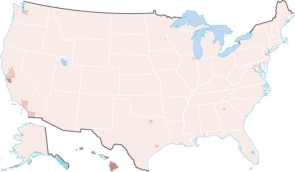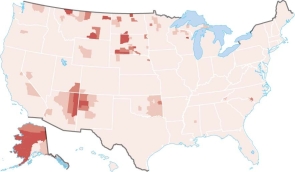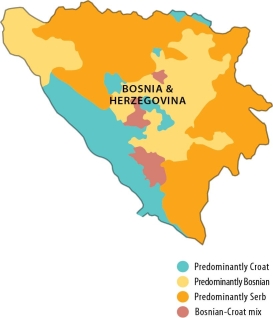A) Hispanic
B) African American
C) Asian American
D) American Indian
E) European
G) B) and D)
Correct Answer

verified
Correct Answer
verified
Multiple Choice
A nationality is
A) a group of people tied to a place through legal status and tradition.
B) a country.
C) ethnic identity.
D) any cohesive group of people.
E) a group with shared religion, language, and origin of birth.
G) B) and C)
Correct Answer

verified
A
Correct Answer
verified
Multiple Choice
Balkanization refers to
A) the creation of nation-states in southeastern Europe.
B) the breakdown of a state due to conflicts among nationalities.
C) a small geographic area that cannot successfully be organized into states.
D) ethnic cleansing.
E) religions splintering into opposing groups.
G) None of the above
Correct Answer

verified
Correct Answer
verified
Multiple Choice
The distinction between nationality and ethnicity is important because
A) nationalities usually form independent countries.
B) it is similar to the difference between race and ethnicity.
C) nationality is inherited but ethnicity is not.
D) ethnicity is considered more important than nationality.
E) nationality is considered more important than ethnicity.
G) C) and D)
Correct Answer

verified
Correct Answer
verified
Multiple Choice
Which of the following does the United States Census Bureau not consider a race?
A) Japanese
B) Black
C) Hispanic/Latino
D) White
E) Samoan
G) A) and C)
Correct Answer

verified
Correct Answer
verified
True/False
The largest number of slaves shipped across the Atlantic went to North America.
B) False
Correct Answer

verified
Correct Answer
verified
Multiple Choice
Ethnic war in Sri Lanka ended
A) with the surrender of the Sinhalese.
B) in a cease-fire brokered by the UN.
C) with independence from colonial occupation.
D) with the defeat of the Tamils
E) It has not ended;the civil war continues today.
G) None of the above
Correct Answer

verified
Correct Answer
verified
Multiple Choice
Figure 7.2.3  -This map displays the distribution of what ethnicity in the United States?
-This map displays the distribution of what ethnicity in the United States?
A) Hispanic
B) African American
C) Asian American
D) American Indian
E) European
G) C) and D)
Correct Answer

verified
C
Correct Answer
verified
Multiple Choice
Latinos and Hispanics are clustered in what areas of the United States?
A) Northeast, cities
B) West, Southwest
C) Southwest, Southeast
D) cities
E) Pacific Northwest, Plains states
G) B) and D)
Correct Answer

verified
Correct Answer
verified
Multiple Choice
Figure 7.2.4  -African American and Hispanic ethnicities are
-African American and Hispanic ethnicities are
A) racially similar.
B) not measured by the U.S. Census.
C) similarly distributed across the United States.
D) never found near one another.
E) both spatially concentrated in neighborhoods within large American cities.
G) A) and B)
Correct Answer

verified
Correct Answer
verified
Multiple Choice
Racism is belief in
A) the biological classification of people.
B) superiority of some groups because of racial identity.
C) inferiority of other groups because of racial identity.
D) all of the above
E) B and C
G) A) and C)
Correct Answer

verified
Correct Answer
verified
Multiple Choice
Josip Broz Tito
A) encouraged ethnic cleansing in Bosnia & Herzegovina of Bosnian Muslims.
B) served as a centripetal force for Yugoslavia.
C) was elected to lead a newly independent Kosovo.
D) created the term "Balkanization."
E) was born in Albania but claimed Serbian ethnicity.
G) B) and C)
Correct Answer

verified
Correct Answer
verified
Multiple Choice
Figure 7.2.4  -This map displays the distribution of what ethnicity in the United States?
-This map displays the distribution of what ethnicity in the United States?
A) Hispanic
B) African American
C) Asian American
D) American Indian
E) European
G) D) and E)
Correct Answer

verified
Correct Answer
verified
True/False
Clustering of ethnicities is most pronounced at the neighborhood level in the United States.
B) False
Correct Answer

verified
Correct Answer
verified
True/False
A majority of people in Lebanon are Muslim.
B) False
Correct Answer

verified
Correct Answer
verified
Multiple Choice
Race is
A) characterized by Caucasian, African American, and Hispanic/Latino.
B) self-identification with a group sharing a biological ancestor.
C) determinable from physical characteristics.
D) evenly distributed around the world.
E) defined by statute in most states.
G) B) and E)
Correct Answer

verified
Correct Answer
verified
Multiple Choice
Geographers are concerned with ethnicity because
A) it is a core element of culture that individuals always carry with them.
B) it is another term for race.
C) ethnicities are always changing.
D) folk and popular ethnicities sometimes come into conflict.
E) it is the best way to divide people into countries.
G) C) and E)
Correct Answer

verified
Correct Answer
verified
True/False
Kosovo is recognized as independent by all major countries of the world.
B) False
Correct Answer

verified
False
Correct Answer
verified
Multiple Choice
Figure 7.8.3  -Examining this map of Bosnia & Herzegovina reveals
-Examining this map of Bosnia & Herzegovina reveals
A) Bosnia & Herzegovina today is a very unstable country.
B) Croats face daily discrimination.
C) ethnic cleansing removed many Bosnian Muslims.
D) Bosnians and Croats united against Serbs.
E) the greatest conflict was over Kosovo, which is now independent.
G) All of the above
Correct Answer

verified
Correct Answer
verified
True/False
Ethnic groups in the United States no longer conflict with one another.
B) False
Correct Answer

verified
Correct Answer
verified
Showing 1 - 20 of 84
Related Exams